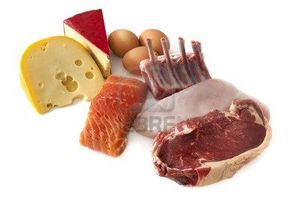Biotin
| See Also | Vitamins |
|---|
Biotin, or Vitamin B7 is one of the many B vitamins which are all water-soluble micronutrients. It is involved in four carboxylase biochemical reactions meaning that it adds a carbon dioxide molecule to another molecule to yield a carboxyl group. All of these four reactions are involved in the metabolism of sugar, fat, and amino acids in the body. Biotin is also important for cell growth and replication and is synthesized in the intestines by gut bacteria.
Contents
Food Sources
The following foods have the highest concentration of biotin. For a more expansive list on food sources of specific nutrients visit Health Canada's Dietary Reference Intakes for Vitamins or USDA's National Nutrient Database
Other food sources include:[1]
- grains: whole wheat
- protein sources: organ meats
- vegetables: cauliflower, mushrooms,
- dairy: cheese, eggs
- Other sources include: soybeans, nuts, peanuts
Raw egg white contain avidin, a protein that binds biotin and prevents its absorption.
Uses
The following are the primary uses of Biotin. [2]
- Promotion of strong nails and healthy hair: Supplementation with biotin has shown improvement in nail thickness and brittleness and health of the hair. With regards to hair, biotin has an ability to improve metabolism of scalp oils, thus contributing to healthier locks.
- Seborrheic Dermatitis: also known as cradle cap when it occurs in infancy. It has been postulated that it is caused by either a dietary deficiency of biotin or a lack of biotin producing gut flora. Biotin supplementation has shown improvement by either giving directly to an infant or via mother's breast milk. Effective treatment of seborrheic dermatitis in adults require a combination of B vitamins in order to be effective (biotin, B6, B5, B3, B1, and the lipotropics which help metabolized fats).
- Diabetes: Biotin has been shown to increase insulin sensitivity as well as improve glucose uptake and utilization by the liver. It has also been helpful in treatment of diabetic neuropathy.
Deficiency Symptoms
Adult signs include:
- dry, scaly skin, seborrhea
- nausea
Infants under 6 month:
Excess Symptoms
None, as Biotin is water-soluble, any excess consumption or supplementation is excreted through the kidneys.
Assessment Procedure
Common Deficiency Tests: [3]
- Urine Alpha-Hydroxisovalerate - positive result is high
Prescribing Considerations
- Biotin is available as either isolated biotin or as biocytin, a biotin derivative from brewer's yeast containing 65% biotin [2].
- The recommended dosages varies based on age and health status. To determine what your specific requirements are talk to your naturopathic doctor or other trained medical professional.
- Infants: 10mg (under 6 months); 15mg (6-12 months)
- Child - Adult: 20mg (1-3 years); 25mg (4-6 years); 30mg (7-10 years); 30-300mg (11+ years)
Safety
Biotin is extremely safe and no side effects of supplementation have been reported.
Drug Interactions
- Drug Interactions include:[2]
- Other B Vitamins and Coenzyme Q10 - Biotin works synergistically with other B vitamins and CoQ10.
- Alcohol - Inhibits the absorption and utilization of biotin.
- Antibiotics - Drug decreases biotin levels because it destroys biotin-producing gut flora.
References
- ↑ Medlineplus [1]
- ↑ 2.0 2.1 2.2 Murray Michael T (2005) Encyclopedia of Nutritional Supplements, The Essential Guide for Improving Your Health Naturally, Prima Publishing
- ↑ Bralley J Alexander and Lord Richard S. 2005 Laboratory Evaluations in Molecular Medicine, Nutrients, Toxicants, and Cell Regulators Institute for Advances in Molecular Medince, GA
